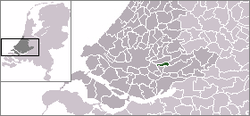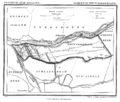Nieuw-Lekkerland
Nieuw-Lekkerland (![]()
Nieuw-Lekkerland | |
|---|---|
Town and former municipality | |
 Flag  Coat of arms | |
 | |
| Country | Netherlands |
| Province | South Holland |
| Municipality | Molenwaard |
| Area (2006) | |
| • Total | 12.77 km2 (4.93 sq mi) |
| • Land | 10.40 km2 (4.02 sq mi) |
| • Water | 2.38 km2 (0.92 sq mi) |
| Population (1 January 2007) | |
| • Total | 9,436 |
| • Density | 907/km2 (2,350/sq mi) |
| Source: CBS, Statline. | |
| Time zone | UTC+1 (CET) |
| • Summer (DST) | UTC+2 (CEST) |
The former municipality included the population centres of Nieuw-Lekkerland (divided into the two neighbourhoods Dorpslaan and Middelweg) and Kinderdijk.
The town's name evolved slightly over time: in 1280 Leckerlant, in 1331 Niewe Leckerland, and in 1903 Nieuw Lekkerland. It means "land of or near the river Lek" with the addition of "nieuw" ("new") to distinguish it from Old Lekkerland (now Lekkerkerk) across the river.
History
The name Nieue-Leckelant appears for the first time around 1325 and distinguishes it from Oudt-Leckelant (now Lekkerkerk). The most notable building used to be Castle Schoonenburg. Because of its elevated location on a mount, it served as a refuge for the people during floods before the reclamation of the Alblasserwaard. After 1456, the castle was abandoned and became a ruin. Its remains were thereafter probably used to rebuild a church tower. only the mount is still visible. The Reformed Church is from 1848.
Its economy was based on agriculture, cattle raising, and fishing. In the 19th century ship building and industry developed, resulting in an increasing population: from 770 in 1820, 1153 in 1840, 2000 in 1867, to 9400 in 2004.
Till 2013, Nieuw-Lekkerland was one of the few remaining municipalities in the Alblasserwaard that never merged with any other municipality.
Attractions
The retirement home on the Lek dike was built in 1885, designed by Aart den Boer. Originally commissioned as a dike management house by Mr. Leendert Smit Fopzoon, Ambachtsheer van Nieuw-Lekkerland and his spouse Neeltje Smit. The eclectic-styled building has space for about 15 inhabitants and a landlord. The basement houses the kitchen, the ground floor holds the common room and the second floor contains the room of the regent.[1]
Demographics (2007)
Nieuw-Lekkerland had the second highest Natural Growth Rate of Population in Netherlands in 2007. But currently the birth rate is falling sharply and approaching below replaceable fertility.
- Birth Rate: 15.57 per 1000 (Down from 18.68 in 2000)
- Death Rate: 3.49 per 1000
- NGR: +1.21% per year.[2]
Gallery
 Nieuw-Lekkerland in 1867
Nieuw-Lekkerland in 1867- De Hoge Molen in Nieuw-Lekkerland
- Kleine of Lage Molen in Nieuw-Lekkerland
 House in Nieuw-Lekkerland, 1643
House in Nieuw-Lekkerland, 1643
References
- "Monument L. & N. Smit's Stichting". Dutch register of Monuments (in dutch). Rijksdienst voor het Cultureel Erfgoed. Retrieved 4 September 2015.
- "CBS StatLine - Population dynamics; birth, death and migration per region". Statline.cbs.nl. 2013-09-24. Retrieved 2014-05-03.